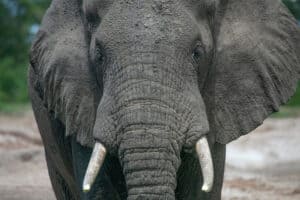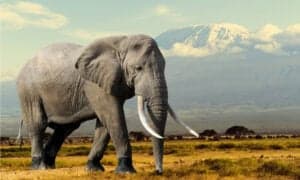The elephant has captured the hearts of so many of us because of its gentle nature. Today, there are two different species of elephants – African elephants and Asian elephants. African elephants make up two different elephant species: the African bush elephant (L. africana) and the smaller African forest elephant (L. cyclotis). Both of these elephant species are highly social and intelligent, making them extraordinarily fascinating to study. Did you know, for example, that elephants actually soothe one another when distressed by calling and touching one another? In order to better understand them, let’s take a look at what African elephants eat and more about their feeding habits.
What Do African Elephants Eat?
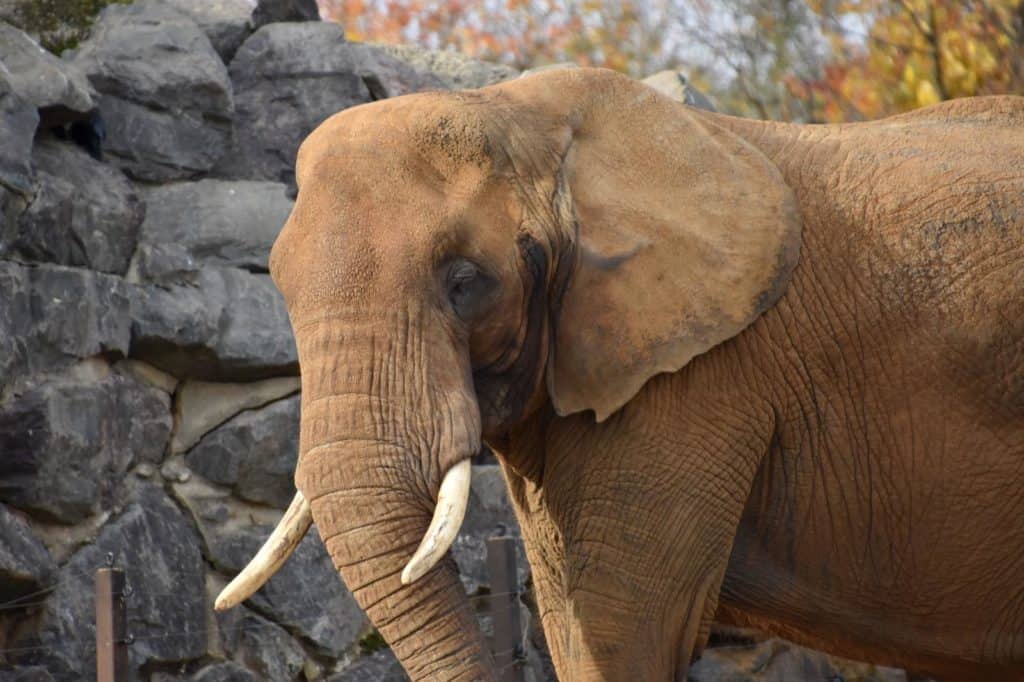
African elephants are classified as herbivores, meaning they only eat plants.
©Millie Bond – Copyright A-Z Animals
African elephants eat a diet that consists of grass, leaves, bark, fruit, and a variety of foliage. They are classified as herbivores. Although they eat a variety of vegetation, their absolute favorite is tree bark. This is because tree bark has a lot of nutritional value for them. It is rich in calcium and is an excellent source of dietary fiber as this aids them with their digestion. African elephants will use their tusks to carve into the trunk and pull the bark from it to eat.
It has also been discovered that African elephants are seasonal eaters, and as a result, they tend to alter their diets based on the season. A study published in 2017 looking into the eating patterns of elephants in Africa found that these elephants consume large quantities of grass during the summer months. In winter, when these food types become scarce, elephants consume woody plant leaves and twigs as leaves fall, followed by bark and roots as these are shed. This gives us even more insight into the fascinating eating habits of African elephants!
African bush elephants are the largest terrestrial animals. Depending on the species, African elephants can grow to 8.2 to 13 feet tall and weigh 5,000 to 14,000 pounds. Due to the size of these animals, they require a large amount of food to survive. African elephants are always moving in the African Savannahs and forests in search of their next meal. As a result, you can usually find them moving about.
A Complete List Of What African Elephants Eat
There is no way you will ever be able to see an elephant eating any form of meat or living material as they are herbivores. In other words, herbivores eat only vegetation like plants and bark and do not kill other animals to feed on them. The eating habits of African elephants make them known as food browsers. In addition to leaves and roots, they find bark, twigs, and roots on many different trees during their browsing. As a result, African elephants will eat a large variety of vegetation around them.
The following foods are part of their diet:
- Tree bark
- Flowers
- Bushes
- Leaves
- Shrubs
- Grasses
- Roots
- Fruits such as figs and mangoes
- Twigs
The African elephant eats a wide variety of plants and fruits, as you can see. Their diet is quite diverse and allows them to survive in their habitat. Let’s take a look at how African elephants forage for food now that we know what they eat.
How Do African Elephants Forage For Food?
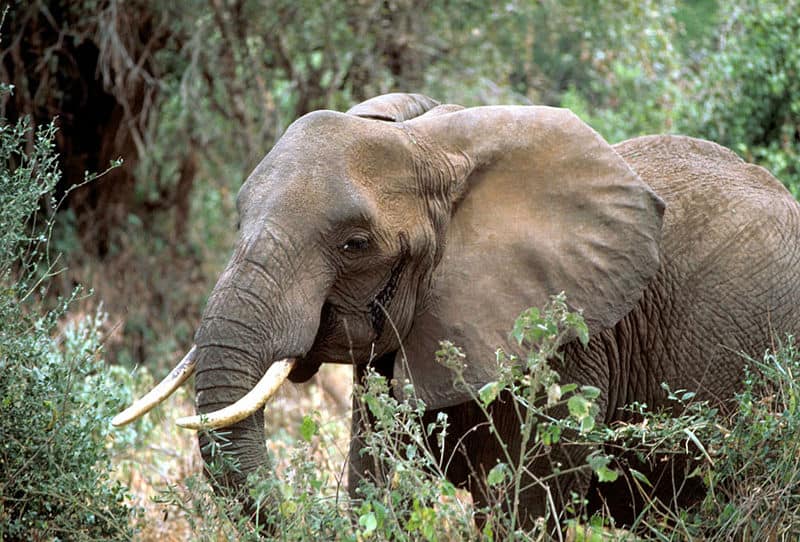
African elephants use their tusks and trunks to forage for food.
©Gary M. Stolz / U.S. Fish and Wildlife Service, Public domain, via Wikimedia Commons – License
Since African elephants are herbivores, this means that they must forage for their food. They can spend up to 18 hours a day simply foraging for food sources. Regarding finding their food sources, as we mentioned, African elephants are considered food browsers. That means that they will walk great distances in search of their food.
As a result of their trunk, they can find food more easily and more quickly. There are so many things that an elephant’s trunk can do, and you might not know it, but it is so much more than just its nose. Due to their long and flexible trunks, elephants can grab food, making its trunk essential when they’re trying to eat. Small twigs and branches can be broken off and brought to his mouth by wrapping its trunk around them. He is able to reach branches other herbivores cannot because of his trunk, adding even more reach to his already great height.
Elephants in Africa also use their tusks along with their trunks. The tusk is essential in ensuring an elephant gets the proper nutrition. During times of drought, he digs into the ground with his tusks to find salt deposits and water. The elephants can also scrape off the bark from trees with their tusks. This also allows them to break up branches into smaller, more edible pieces.
Why Do Elephants Eat So Much?
As we mentioned, African elephants can forage up to 18 hours daily. It is important to emphasize that elephants are not small animals capable of surviving solely on one or two leaves per day. In order to maintain their huge bodies, elephants need a similar amount of food to sustain their immense size. It is impossible for them to survive if they do not do this.
It depends on the elephant, but African elephants consume between 100 and 400 pounds of food daily. In addition, they can drink up to 40 liters of water per day. In order to maintain their energy levels throughout the day, these large animals require all of this food. In addition to that, there are other factors to consider. As food browsers, they usually travel long distances per day. In order to survive, an animal that moves 9-19 miles with such a large body needs to eat enough food. It should be noted that natural water is limited in dry regions. A lot of water is consumed by elephants living in those areas to keep hydrated and retain enough water for future trips.
What Is The Environmental Impact of African Elephants?
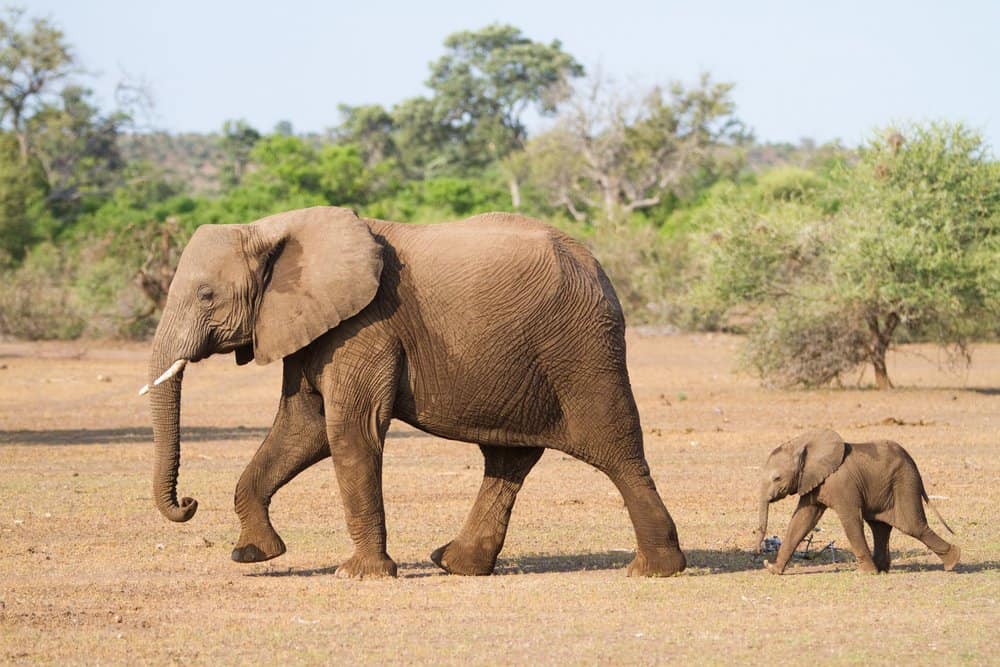
African elephants are incredibly important to the ecosystem, as they help promote the growth of new plants.
©Villiers Steyn/Shutterstock.com
Many people are unaware of the fact that an African elephant’s diet plays an important role in the health of the environment. African elephants are one of the largest land mammals on earth, and they play an important role in balancing the ecosystems of their home continent, Africa. By trampling through dense forests and grasslands in search of food, these grazers leave room for smaller wildlife to coexist with larger ones.
As elephants dig dry riverbeds during periods of low rainfall, they also create water holes that can be used by other animals when there is low rainfall. The African elephant’s favorite foods include a wide variety of vegetables and fruits, as previously mentioned. Because they do not have a highly developed digestive system, they are only able to digest 40 percent of what they eat. During their travels over vast rangelands, herds disperse seeds in their dung. This then contributes greatly to the growth of new plants in the surrounding area.
Are African Elephants Dangerous To Humans?
The elephant is generally viewed as a peaceful animal. However, one should not assume that they are harmless simply because they are peaceful animals. In the end, we are talking about an animal weighing up to 7,000 kilograms. It is important to approach African elephants with caution due to their size. Approximately 500 people die every year due to African elephants trampling and crushing them. Elephants tend to become much more aggressive in areas where poaching occurs or where the animals’ habitat is in danger since poaching threatens their survival. In the wild, you should always maintain a safe distance and exercise caution around African elephants.
The photo featured at the top of this post is © iStock.com/fotografie-kuhlmann
Thank you for reading! Have some feedback for us? Contact the AZ Animals editorial team.



